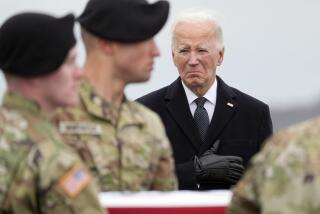Compensation to Iran Families Not Ruled Out
- Share via
WASHINGTON — President Reagan said Tuesday that the United States, which sent a private note to the Iranian government expressing its “deep regret” for the downing of Iran Air Flight 655, has offered enough of an apology to Tehran.
But the White House did not rule out offering some sort of reparations to the relatives of the 290 people killed aboard the airliner.
Meanwhile, there were indications that congressional leaders are preparing to introduce legislation to compensate the families--a step that could put Congress in the lead in a sensitive foreign policy and political issue.
Support From Experts
Such a move won quick support Tuesday from a number of foreign policy experts, among them Zbigniew Brzezinski, former President Jimmy Carter’s assistant for national security affairs, and Stansfield Turner, director of the CIA during the Carter Administration. Two former national security advisers, Robert C. McFarlane and Brent A. Scowcroft, had already said that they favored granting an apology and compensation.
On the first day of business in the nation’s capital after the Navy shot down the jetliner over the Persian Gulf, the White House kept its low-key approach--giving no suggestion that it would shift its policy in the volatile region as a result.
But support from both Republican and Democratic leaders for some form of reparations raised the possibility that, regardless of his view on the issue, Reagan could be presented with legislation granting such payments and would have to choose between going along or vetoing it.
Reflecting the Administration’s effort to shut the window on the initial aspect of the tragedy--the military action that culminated with the destruction of the wide-bodied Airbus A-300 jetliner when it was struck by at least one missile fired by the U.S. Navy cruiser Vincennes--the President said in a one-page report to Congress: “We regard this incident as closed.”
However, the report noted that the Administration is pressing ahead with a Navy investigation into the events surrounding the downing of the airliner.
Describing the military action in the Strait of Hormuz at the mouth of the Persian Gulf on Sunday, Reagan said that the cruiser Vincennes and the frigate Elmer Montgomery sank two small Iranian boats and damaged a third, in response to an attack on a U.S. helicopter.
“Regrettably, in the course of the U.S. response to the Iranian attack, an Iranian civilian airliner was shot down by the Vincennes, which was firing in self-defense at what it believed to be a hostile Iranian military aircraft,” Reagan said in his letter to the House and Senate. “We deeply regret the tragic loss of life that occurred.”
‘Entirely Appropriate’
White House spokesman Marlin Fitzwater was reluctant Tuesday to characterize any U.S. statement about the tragedy as an apology.
“The President believes that the expressions of regret and sadness were entirely appropriate, and they were passed on to the Iranian government,” Fitzwater said. “Our regret over the loss of life and the immense human tragedy has been stated in appropriate forums.”
He said that the United States’ “deep regret” was expressed Sunday in a private message dispatched to the government of Iran. It was forwarded to Tehran by the Swiss government, which represents U.S. interests in Iran. The United States and Iran do not maintain diplomatic relations.
The White House spokesman said the message also asserted that the United States had not intended to target the civilian airliner.
An Affirmative Answer
For his part, Reagan, asked by reporters whether the United States had apologized sufficiently, said, “Yes.”
He made the comment as he left the White House to visit President Jose Napoleon Duarte of El Salvador, who is undergoing treatment for liver cancer at Walter Reed Army Medical Center.
Asked about speculation that the Iranian airliner was a decoy for an attacking aircraft, Reagan replied: “That’s why we’re having an investigation.”
Reagan’s own involvement in the aftermath of the attack has been limited. He discussed the tragedy Sunday in telephone calls with senior advisers but called no special meetings on it after he returned to Washington from Camp David, Md., on Monday. And according to Fitzwater, Reagan’s only contact with Adm. William J. Crowe Jr., chairman of the Joint Chiefs of Staff, was in a conference call Sunday with other Administration officials.
Research by Lawyers
The question of compensation for the families of the victims gained public attention in Congress--and privately, lawyers at the Pentagon and State Department were understood to be researching U.S. law to make recommendations to Reagan. The United States supported unsuccessful demands made by South Korea for compensation for the families of the 269 victims of Korean Airlines Flight 007, who were killed when their Boeing 747 was shot down by Soviet fighters over Soviet territory Sept. 1, 1983.
Fitzwater, making it clear that no decision had been made about compensation, told reporters: “That is one issue that has not been considered at this point.” He said that the investigation by the naval board--which he defended as an appropriate body to conduct the inquiry--is “the first order of business.”
‘Peace and Stability’
Sen. John W. Warner (R-Va.), the senior Republican on the Senate Armed Services Committee, told reporters that paying compensation would be “a step in the direction of bringing peace and stability to the region.”
He did not specify a sum of money that should be paid but suggested that Congress could be guided by the sums established for loss of life in international aviation agreements.
“I think we should move very swiftly on it,” he said.
Warner added that the Senate leadership--Republicans as well as Democrats--are likely to propose legislation soon after Congress reconvenes today after the Fourth of July recess.
In London, House Speaker Jim Wright (D-Tex.) predicted that Congress would approve such a compensation bill. “. . . If that would assuage the grief of the other aggrieved party, surely we could do that,” he said. “Congress would support that, if it were requested.”
More to Read
Sign up for Essential California
The most important California stories and recommendations in your inbox every morning.
You may occasionally receive promotional content from the Los Angeles Times.













